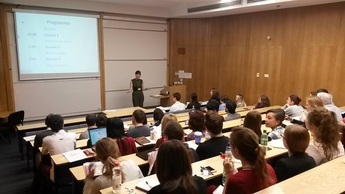Undergraduate Teaching

I currently convene an undergraduate 3rd year module on Current Issues in Psychology which includes an option to specialise in Environmental Psychology.
I also lecture on the 2nd year Social and Developmental Psychology (C82SAD) module, the Masters Conversion module on Social and Developmental Psychology (C84SAD)
and the 1st year Social Psychology course (C81SOC), often give guest lectures and supervise third year projects (students please see the relevant Moodle page and recent publications for topics).
Proud to say that Juan See Wen (my final year student in 2014-15) won the Jonathan Sime award recognising the significant contribution to People-Environment studies of her final year project. Amara Waqar (2015-16) received a special commendation within the Jonathan Sime award and Isobel Madle (2017-18) was shortlisted for this award.
I also lecture on the 2nd year Social and Developmental Psychology (C82SAD) module, the Masters Conversion module on Social and Developmental Psychology (C84SAD)
and the 1st year Social Psychology course (C81SOC), often give guest lectures and supervise third year projects (students please see the relevant Moodle page and recent publications for topics).
Proud to say that Juan See Wen (my final year student in 2014-15) won the Jonathan Sime award recognising the significant contribution to People-Environment studies of her final year project. Amara Waqar (2015-16) received a special commendation within the Jonathan Sime award and Isobel Madle (2017-18) was shortlisted for this award.
Postgraduate
I currently supervise PhD students:
Amy Liscoe
Elizabeth Marsh
Daniel Fletcher
Raphael Derecki
Completed PhD students:
Mariana Gaytan
Vanja Ljevar
Nandini Anant
Liz Dowthwaite
Matthew Terrell
If you are interested in working with me on a PhD project, contact me. Broadly speaking, I'm interested in projects relating to public perceptions of energy or climate change, or in relation to attitude or behaviour change in these areas. I'm also interested in risk perception more generally. See below for some more specific current research directions:
- collaborative pro-environmental behaviour
- the role of positive emotions in pro-environmental behaviour
- pro-environmental food behaviour and measuring this objectively
- public perceptions of climate change and sustainable behaviour on social media
- the role of environmental experiences, e.g., negative experiences like flooding, but also positive experiences like community participation, in shaping public perceptions of climate change
Amy Liscoe
Elizabeth Marsh
Daniel Fletcher
Raphael Derecki
Completed PhD students:
Mariana Gaytan
Vanja Ljevar
Nandini Anant
Liz Dowthwaite
Matthew Terrell
If you are interested in working with me on a PhD project, contact me. Broadly speaking, I'm interested in projects relating to public perceptions of energy or climate change, or in relation to attitude or behaviour change in these areas. I'm also interested in risk perception more generally. See below for some more specific current research directions:
- collaborative pro-environmental behaviour
- the role of positive emotions in pro-environmental behaviour
- pro-environmental food behaviour and measuring this objectively
- public perceptions of climate change and sustainable behaviour on social media
- the role of environmental experiences, e.g., negative experiences like flooding, but also positive experiences like community participation, in shaping public perceptions of climate change
